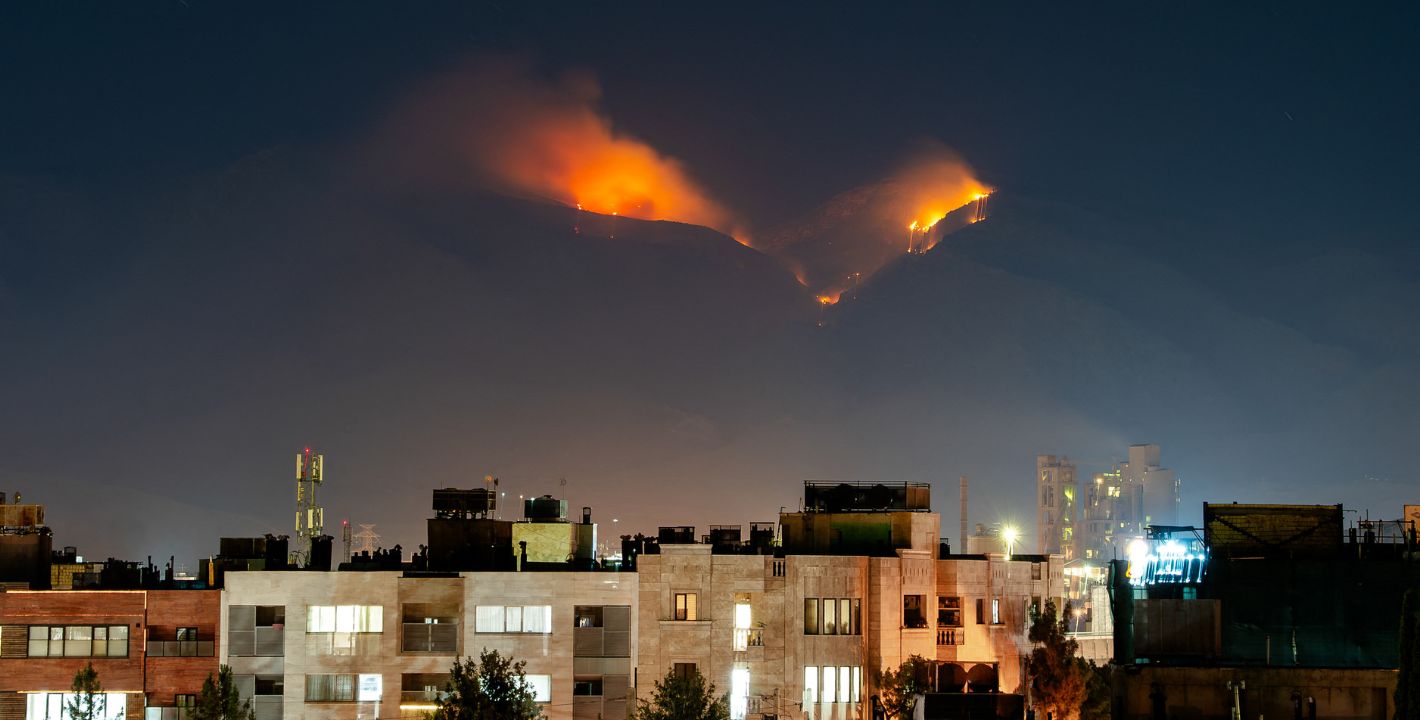Michael Young
{
"authors": [
"Michael Young"
],
"type": "commentary",
"blog": "Diwan",
"centerAffiliationAll": "dc",
"centers": [
"Carnegie Endowment for International Peace",
"Malcolm H. Kerr Carnegie Middle East Center"
],
"collections": [
"Palestine: The Wars in the War"
],
"englishNewsletterAll": "menaTransitions",
"nonEnglishNewsletterAll": "",
"primaryCenter": "Malcolm H. Kerr Carnegie Middle East Center",
"programAffiliation": "MEP",
"programs": [
"Middle East"
],
"projects": [],
"regions": [
"Levant",
"Iran",
"Israel",
"Palestine",
"Middle East"
],
"topics": [
"Political Reform"
]
}
Source: Getty
The Perils of A Gaza Invasion
As Israel considers entering the Palestinian territory, its operation may have dramatic regional implications beyond war.
What is Israel’s objective in entering Gaza, beyond ensuring that “there is no Hamas in Gaza,” as former Israeli prime minister Yair Lapid has stated? Self-confident exclamations like those of Lapid often get blindsided by reality, particularly in a volatile context like the current war, where the picture is more unclear by the day.
It’s reasonable to assume that the destruction of a Gaza hospital on Tuesday may represent an obstacle to an Israeli assault on the territory. Israel has insisted that the hospital attack was the result of a malfunctioning Islamic Jihad rocket. Yet without a neutral investigation, why should anyone believe the Israelis? They lied about the Qana massacre in April 1996 in Lebanon, saying the bombing of a United Nations base was a mistake, before a UN investigation contradicted this assessment. Similarly, the Israelis lied about the killing of journalist Shireen Abou Aqleh in May 2022. After first blaming Palestinians, the Israelis later concluded there was a “high possibility” she had been “accidentally” hit by Israeli gunfire directed at Palestinian gunmen. However, investigations by several media outlets, including CNN, the New York Times, the Washington Post, the Associated Press, in addition to Bellingcat and a UN-mandated body, refuted key aspects of the Israeli narrative.
Even assuming that the Gaza hospital was hit mistakenly by a Palestinian rocket, publics on both sides are so polarized today that no one is really interested in the truth. In other words, Israel has caused enough victims, and committed enough war crimes (as has Hamas) in its current military campaign, that many people both in the region and internationally have limited patience for permitting an open-ended invasion of Gaza that causes more carnage among the civilian population.
There are those who believe that Israel will go ahead with a ground assault anyway, and they are probably correct. But that is not the most important question. More significant is what such an operation can hope to achieve, when Israeli officials have repeatedly implied they would need time, maybe months, to secure their aims. Indeed, the fact that the invasion of Gaza has not yet started indicates that something may be delaying the move. If one had to offer an educated guess, this could be because of a combination of the complexity of planning such a high-risk operation, the U.S. urging Israel to proceed cautiously, and requests for clarification from Israel’s military, relayed by two former military men in the unity cabinet, Benny Gantz and Gadi Eisenkot, on what the exact goals in Gaza would be.
The Americans know that an invasion makes a regional war much more likely, and that if the conflict spreads it is likely to include the targeting of U.S. forces and interests throughout the Middle East. One has to wonder if this was not in President Joe Biden’s mind when he told Israeli officials during his trip to Israel this week that its wartime decisions required “being deliberate. It requires asking very hard questions. It requires clarity about the objectives and an honest assessment about whether the path you are on will achieve those objectives.”
The Israeli military understands that it may lose a significant number of soldiers in the labyrinthine, rubble-filled byways of Gaza, against determined Hamas combatants who have a home advantage. Success may be achievable if the objectives are clearly defined and narrowed, but at this point nothing in Israel’s stated goals are anything but ambiguous, overambitious, and based on a misperception of what the regional and global mood will accept.
On top of this, U.S. and Israeli officials don’t seem to be closely aligned on the aims of such an operation. In a 60 Minutes interview on October 15, Biden seemed to want it both ways when he said he would tell the Israelis that an occupation of Gaza would be a big mistake, soon after saying that they had “to go after Hamas.” But what does “going after Hamas” mean if Israel does not leave behind some military presence—effectively an occupation—to ensure the group will not revive itself?
In other words, unless Israel is willing to enter every home in Gaza and arrest tens of thousands of young men suspected of being Hamas members, and carries them off (a near-unworkable endeavor), there are no guarantees that it can terminate the organization. And that’s assuming the Israelis will have the opportunity to knock on doors and investigate everybody to determine their loyalties while military fronts are opened up from Lebanon, Syria, and perhaps the West Bank. Such a scenario is so ludicrous that it’s impossible to imagine it happening.
There is another potential tactic that the Israelis may try, namely a redux of the siege of West Beirut in 1982. At the time, Israeli forces had trapped the Palestinian leadership in the western half of the Lebanese capital, cutting off water, electricity, and most fresh food. The point was to impose on the Palestinians a withdrawal from Beirut, which ultimately succeeded. I lived through the almost three-month siege and distinctly recall that, while Israel easily had the upper hand militarily, it was only through painstaking negotiations, mediated by the U.S. envoy Philip Habib, that the Palestinians finally agreed to depart. More importantly, the Palestinian exit in no way eliminated the Palestine Liberation Organization, let alone its presence in Lebanon. In other words, the Lebanon experience showed that, if Israel tries to replicate it in Gaza, the operation may require more time than the Israelis actually have at their disposal and is unlikely to be fully effective.
So, the options are not ideal for Israel. And that’s not even going into the details of a conflict with Hezbollah, which will only add layers of complication to Israeli political and military objectives. Nor do we know how Washington might try to put a brake on Israeli actions as it tries to avert a regional war. For the Americans, if the conflict in Gaza spreads to all fronts—inside Israel or beyond that to target U.S. forces in the Middle East–it may mean that America’s enemies seek nothing less than to eliminate the U.S. presence in the region and decisively cripple Israel.
This may sound hyperbolic, and it partly is. Yet everywhere around the region, Iran has set up networks of proxy and allied forces that are often stronger than the states in which they operate. Given the U.S. desire to escape entanglements in the region, a decisive push to expel the Americans is not so absurd a concept as it sounds, nor is the idea of placing Israel in a state of permanent insecurity and instability. The only outcome, if both the United States and Israel feel they are vulnerable and if Israel is threatened existentially, could be for them to attack Iran itself. The outcome would be apocalyptic, with China and Russia taking the side of Tehran, in a region that is increasingly hostile to the Americans and Israelis.
Can this be avoided? Certainly, but not if the Biden administration goes along with an Israeli invasion of Gaza that is allowed to inflame the region and will probably fail to meet its objectives. The correlation of forces in the Middle East is not necessarily in favor of the United States and Israel. The U.S. public is unwilling to support a bruising military campaign to reassert American power there, and it’s unclear if the mood among Washington’s Arab allies is so very different. The United States has spent so much time saying that it wants to disengage from the Middle East, that it didn’t notice how the Middle East was itself disengaging from America.
About the Author

Editor, Diwan, Senior Editor, Malcolm H. Kerr Carnegie Middle East Center
Michael Young is the editor of Diwan and a senior editor at the Malcolm H. Kerr Carnegie Middle East Center.
- Axis of Resistance or Suicide?Commentary
- Iran and the New Geopolitical MomentCommentary
Michael Young
Recent Work
Carnegie does not take institutional positions on public policy issues; the views represented herein are those of the author(s) and do not necessarily reflect the views of Carnegie, its staff, or its trustees.
More Work from Diwan
- Axis of Resistance or Suicide?Commentary
As Iran defends its interests in the region and its regime’s survival, it may push Hezbollah into the abyss.
Michael Young
- U.S. Aims in Iran Extend Beyond Nuclear IssuesCommentary
Because of this, the costs and risks of an attack merit far more public scrutiny than they are receiving.
Nicole Grajewski
- What Gaza Showed UsCommentary
The conflict did not reshape Arab foreign policy; on the contrary it exposed its limits.
Angie Omar
- Iran and the New Geopolitical MomentCommentary
A coalition of states is seeking to avert a U.S. attack, and Israel is in the forefront of their mind.
Michael Young
- Kurdish Nationalism Rears its Head in SyriaCommentary
A recent offensive by Damascus and the Kurds’ abandonment by Arab allies have left a sense of betrayal.
Wladimir van Wilgenburg







